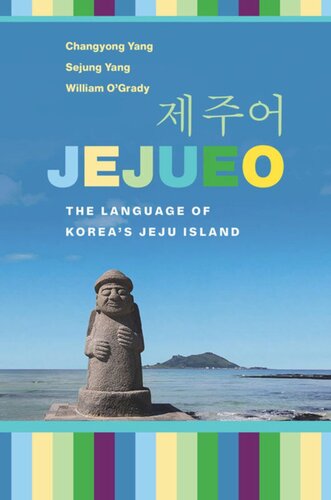

Most ebook files are in PDF format, so you can easily read them using various software such as Foxit Reader or directly on the Google Chrome browser.
Some ebook files are released by publishers in other formats such as .awz, .mobi, .epub, .fb2, etc. You may need to install specific software to read these formats on mobile/PC, such as Calibre.
Please read the tutorial at this link: https://ebookbell.com/faq
We offer FREE conversion to the popular formats you request; however, this may take some time. Therefore, right after payment, please email us, and we will try to provide the service as quickly as possible.
For some exceptional file formats or broken links (if any), please refrain from opening any disputes. Instead, email us first, and we will try to assist within a maximum of 6 hours.
EbookBell Team

0.0
0 reviewsJeju Island, located about 30 miles southwest of the Korean mainland, is famous for its natural beauty, dolhaleubang (“stone grandfather”) statues, haenyeo (“sea women”) divers—and its language, which has only recently been recognized as distinct from Korean. This finding—still considered controversial—undermines the centuries-old belief that Korea has a single language within its borders and opens the door to an entirely new perspective on linguistic diversity in East Asia.
Jejueo: The Language of Korea’s Jeju Island offers both an introduction to the language and the foundation for a wave of new research on its many unique features. Through its comprehensive approach, the book helps establish the importance of Jejueo to the cultural and linguistic heritage of not only Jeju Island, but also the entire Korean peninsula. After a brief introductory chapter on the history of the island and its culture, the authors work their way through the language step by step, examining its sounds, part-of-speech system, and rich inventory of suffixes for both nouns and verbs, to which several chapters are devoted. Carefully written to minimize technical language and supplemented with hundreds of examples, the work is intended to be accessible to scholars working in all fields of Korean studies.
Jejueo tells the story of a language that has been under wraps for far too long and is now in peril. After centuries of use as the first language of the island, only a few thousand elderly fluent speakers remain, leading UNESCO to classify Jejueo as “critically endangered” in 2010. As the first full-length treatment of Jejueo in English, this book marks a milestone in Korean studies and is sure to trigger extensive discussion of the language and its place in Korean society.